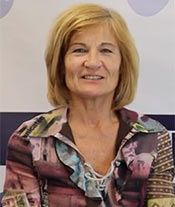Member Highlight: Laure Blanc-Féraud, CNRS Research Director

Member Highlight: Laure Blanc-Féraud
CNRS Research Director
Computer Science, Signals and Systems laboratory of Sophia-Antipolis
(I3S - CNRS/Université Côte d'Azur)
 Laure Blanc-Féraud received her Ph.D. degree and habilitation to conduct research in inverse problems in image processing from University Côte d’Azur in 1989 and 2000, respectively. She is a researcher with Informatique Signaux et Systèmes at Sophia Antipolis (I3S) Lab, the University Côte d’Azur, Centre national de la recherche scientifique (CNRS), Sophia Antipolis, 06900 France.
Laure Blanc-Féraud received her Ph.D. degree and habilitation to conduct research in inverse problems in image processing from University Côte d’Azur in 1989 and 2000, respectively. She is a researcher with Informatique Signaux et Systèmes at Sophia Antipolis (I3S) Lab, the University Côte d’Azur, Centre national de la recherche scientifique (CNRS), Sophia Antipolis, 06900 France.
She served/serves on the IEEE Biomedical Image and Signal Processing Technical Committee (2007–2015; 2019) and has been general technical chair (2014) and general chair (2021) of the IEEE International Symposium on Biomedical Imaging. Blanc-Féraud became a knight of the Ordre national du Mérite in 2011, and of the Legion of Honour in 2015. In 2013, she won the Prix Michel-Monpetit of the French Academy of Sciences. She has been an associate editor of SIAM Imaging Science (2013–2018) and is currently an area editor of IEEE Signal Processing Magazine.
She headed the French national research group GDR Groupement de recherche–Information, Signal, Image et ViSion (ISIS) of CNRS on Information, Signal Image and Vision (2018–2021). She was named a chair holder of the French national Artificial Intelligence Interdisciplinary Institute in 2019. Her research interests include inverse problems in image processing using partial differential equations and optimization. In 2022, Blanc-Féraud was named an IEEE Fellow for contributions to inverse problems in image processing.
We approached Laure Blanc-Feraud to learn more:
Why did you choose to become a faculty in the field of signal processing?
I chose image processing as my thesis subject because at that time (1986), there was a lot of activities in signal processing and very little in image processing. The discipline was in its infancy at the time, and there was a lot to do and discover. Moreover, this discipline enabled me to see the results of mathematical equations and models concretely on pictures. Next, I appreciated working at the interface between mathematics, optics, computer sciences and applicative areas such as earth observation or biology.
How does your work affect society?
I don't think I have a direct impact on society, but my work contributes to advancing software development for image processing. For example, my research in super-resolution for fluorescence microscopy aids biologists in confirming and precisely visualizing various structures in situations with resolutions below the diffraction limit (200 nm) on living cells or tissues. analyzing tumor biopsies, especially the extracellular matrix, should help define biomarkers for assessing the success of immunotherapy. Lastly, work on Earth observation has assisted in agricultural monitoring or land use planning.
What challenges have you had to face to get to where you are today?
It seems to me that my biggest challenge is mentoring PhD students, knowing how to guide a topic along fruitful paths while considering their interests, guiding them while still giving them autonomy. With each new student, it’s a new adventure.
I also had to overcome hesitations before taking on each new responsibility, particularly at the national or international level; it’s an important part of self-work.
Moreover, balancing family life with professional life is of course a challenge for everyone.
What advice would you give to scientists/engineers in signal processing?
I don't have anything specific to give particularly to scientists or engineers in signal processing, but rather to young individuals starting in the research field: you should do what you love, anticipate difficulties, and not get discouraged. It’s a profession where you work a lot and it never stops, but its intellectually rich, full of human discovery, and offers great freedom of action.

